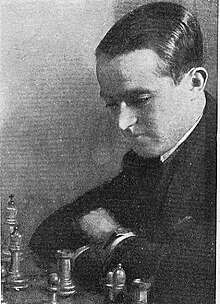Salo Flohr

|
|
| Salo Flohr, Moscow 1933 |
|
| Association |
|
| Born | November 21, 1908 Horodenka , Austria-Hungary |
| Died | July 18, 1983 Moscow |
| title | Grand Master (1950) |
| Best Elo rating | 2754 (April 1936) ( Historic Elo rating ) |
Salo Flohr (in Russian Саломон Михайлович Флор / Salomon Michailowitsch Flor , born November 21, 1908 in Horodenka / Austria-Hungary , † July 18, 1983 in Moscow ) was a Czechoslovak - Soviet chess master . In the 1930s he was considered one of the best players in the world.
Life
Salomon Flohr was born as one of eight children to impoverished Jewish parents. During the First World War , Salo Flohr and his older brother were the only ones to survive a Jewish pogrom in their Galician hometown. As full orphans, the boys moved to Prague in Bohemia around 1916 . After the establishment of Czechoslovakia in 1918 Flohr became a Czechoslovak citizen and grew up in a foster family in Benešov (Beneschau) . At first he sold vegetables and from around 1923 delivered newspapers, but as a teenager Flohr achieved chess successes in Prague cafes, where he played for bets and found a better livelihood there than in civil professions.
Flohr made his international debut at the big tournament in Rogaška Slatina in 1929, where he finished second behind Akiba Rubinstein . This success was the cornerstone for his professional chess playing career that followed. In the following 10 years he was very active in chess and hardly missed an important tournament. He won the traditional Hastings tournament four times in a row from 1931 to 1934. With Michail Botvinnik he won in Moscow in 1935 (before the ex-world champions José Raúl Capablanca and Emanuel Lasker ). He won the tournaments in Poděbrady in 1936 and Kemeri in 1937 (together with Samuel Reshevsky ) before Alexander Alekhine . Flohr drew two competitions against future world champions: in 1932 he played in Amsterdam against Max Euwe 8: 8 (+3 = 10 −3), in 1933 against Michail Botvinnik in Leningrad and Moscow 6: 6 (+2 = 8 −2). Flohr played for Czechoslovakia at five Chess Olympiads . In 1930 in Hamburg no fixed board sequence was prescribed, he played on the first board at the four subsequent Chess Olympiads. In Prague in 1931 he won bronze with the team, in Folkestone in 1933 silver. Flohr achieved the best individual result on the first board in 1935 in Warsaw and in 1937 in Stockholm , in 1930 the second best individual result of all participants. The overall result of all his Olympic games is impressive: +46 = 28 −8 (73.17%).
After his victory in the revenge competition for the world championship in 1937 , Alekhine Salo Flohr referred to as his future challenger, a status that was also determined by a vote in Stockholm on the occasion of the 1937 Chess Olympiad . A duel over 30 games in Czechoslovakia was planned. However, there was no match between the two, due to the difficult political situation of the young Czechoslovak state, which was exposed to an occupation by fascist Germany . Flohr immediately left Czechoslovakia and lived briefly in Sweden , from where he and his wife emigrated to the Soviet Union with the help of his friend Mikhail Botvinnik . In 1942 he received Soviet citizenship.
After the war, Flohr, who now lived in well-off financial circumstances, was initially considered to be a contender for the world title. The FIDE awarded him in 1950 the Grandmaster title . He qualified for the Candidates' tournament in Budapest in 1950 through the Saltsjöbaden Interzonal Tournament in 1948 . But he had his best time behind him, he only finished 8th there (7 points from 18 games). Flohr then concentrated on his writing and chess journalistic activities for various Russian and foreign newspapers, including German papers (he spoke perfect German). As a commentator, he accompanied all the important chess events in the Soviet Union until his death in 1983.
According to the back calculation of the historical Elo number , Flohr took second place in the world rankings from March to November 1935 and in May 1936.
Private
His wife Tatjana Flohr (1933–1993) was a niece of the famous Russian poet Sergei Jessenin .
literature
- Gregory S. Donges: Salo Flohr's best Games of Chess . Thinker's Press, Davenport, Iowa 1985. ISBN 0-938650-34-3 . (English)
- VD Baturinskij (ed.): Grossmejster Flor . Fiskultura i sport, Moscow 1985 (Russian)
- Helmut Wieteck: Salo Flohr and chess life in Czechoslovakia . Neu-Jung-Verlag, Homburg 2005. ISBN 3-933648-26-2 .
Web links
- Literature by and about Salo Flohr in the catalog of the German National Library
- Playable chess games by Salo Flohr on chessgames.com (English)
Individual evidence
- ↑ a b c Vlastimil Hort : Memories: Vlastimil Hort on Salo Flohr . ChessBase, February 22, 2017, accessed on February 23, 2017
- ↑ Salo Flohr's results at the Chess Olympiads on olimpbase.org (English)
- ↑ Willy Iclicki: FIDE Golden book 1924-2002 . Euroadria, Slovenia, 2002, p. 74.
- ↑ Salo Flohr's historical Elo rating on chessmetrics.com (English)
| personal data | |
|---|---|
| SURNAME | Flohr, Salo |
| ALTERNATIVE NAMES | Flohr, Salomon Michailowitsch; Flohr, Salomon; Флор, Саломон Михайлович |
| BRIEF DESCRIPTION | Czechoslovak-Soviet chess master |
| DATE OF BIRTH | November 21, 1908 |
| PLACE OF BIRTH | Horodenka |
| DATE OF DEATH | July 18, 1983 |
| Place of death | Moscow |
